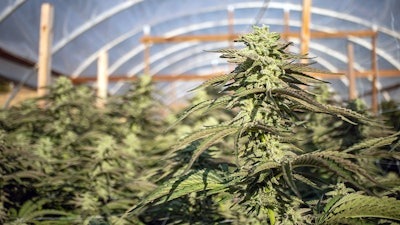
Just before the close of the Colorado legislature’s 2024 session in mid-May, lawmakers approved a bill aimed at streamlining several deficiencies in the state’s regulation of marijuana businesses. While not all of the bill’s intended fixes were passed, certain provisions will facilitate significant changes for businesses, including for licensing processes, contaminant testing protocols, reporting obligations, compliance procedures, and operations management practices.
Colorado Gov. Jared Polis approved the legislation in early June. Several notable changes are discussed below.
Emergency Rulemaking Changes Effective Aug. 7, 2024
Portions of Senate Bill 24-076 (S.B. 24-076) will become effective as of Aug. 7, 2024, pursuant to the Colorado Department of Revenue, Marijuana Enforcement Division’s (MED’s) emergency rulemaking and implementation.[1] These changes include the following:
- Two-year licensing periods for initial and renewal licenses submitted after 11:59 p.m. MST on Aug. 6, 2024 (see the Emergency Rules at 1 CCR 212-3:2-225(A)), as well as repealing the former rule requiring receipt of a local license within one year of receiving the corresponding state license (local authorities will have to separately invoke this change for local licenses).
- Modifications of premises that do not include expanding a licensed premises into contiguous units or areas (which will now require a change of location application) will not need to be submitted to the MED until the next renewal application, along with documentation from the local jurisdiction(s) showing compliance and approval. See Emergency Rules 2-255 and 2-260.
- For all sales of regulated marijuana concentrates, medical and retail marijuana stores must physically attach the MED’s approved education resource on the use of marijuana concentrates[2] to the patient or customer’s receipt of sale, product container, or exit packaging. See Emergency Rules 5-115(C)(5); 5-125(D); 6-110(C)(5); 6-925(B)(5); and 6-1110(C)(5).
- All point-of-sale systems must have the pregnancy warning posted for view by customers/patients. See Rules 5-120(D); 6-115(D); 6-920(B); and 6-1115(D).
- Streamlining and clarifying medical and retail cultivation facilities ability to obtain immature plants, marijuana seeds, and marijuana genetic material from entities that are “licensed or otherwise approved to operate in other jurisdictions.” S.B. 24-076 amends and clarifies this allowance, granting cultivation facilities the ability to obtain genetic material (which now includes immature plants and seeds) from any person licensed by, approved by, or permitted by another jurisdiction to possess or cultivate cannabis plants.[3]
Forthcoming Rule Changes Required by S.B. 24-076
The MED has also begun the rulemaking process for the nonemergency portions of S.B. 24-076, which includes a multitude of changes that will become effective in January 2025. Specifically, for businesses with identical controlling beneficial owners (CBOs) holding multiple licenses, S.B. 24-076 requires a unified application process that will be subject to lower initial and renewal application fees.
S.B. 24-076 also amends the eligibility requirements for social equity applicants who submit their applications for a finding of suitability after Feb. 1, 2025. Until now, the requirements for social equity applicants in Colorado have been:
- Applicants must be Colorado residents;
- The applicant must not be a CBO who has been subject to disciplinary or legal action by the state;
- Applicants must demonstrate at least one of the following:
- Residency in a designated “disproportionately impacted area” or “opportunity zone” for at least 15 years between 1980 and 2010;
- The applicant or one of the applicant’s immediate family members (i.e., parents, legal guardians, siblings, spouse, children, or minors in their guardianship) was arrested for a marijuana offense, convicted of a marijuana offense, or was subject to civil asset forfeiture related to a marijuana investigation; or
- The applicant’s household income in the prior year did not exceed a certain threshold.
Social equity licensees, collectively, must also hold at least 51% beneficial ownership of a marijuana business with a social equity license.
Notably, under the new requirements, the duration of residency in disproportionately impacted areas has been reduced from 15 to five years, and new qualification options based on residency in government-subsidized housing have been added. New requirements have also been imposed with respect to arrests and convictions, with some familial relationships requiring an arrest and a conviction, and others requiring an arrest or conviction with financial disparity evidence. In addition, receiving assistance from any one of several specifically listed federal or state programs may now qualify an applicant in absence of meeting the residency, arrest and/or conviction history, or income requirements.[4]
Product Contaminant Testing
Product testing requirements will only be slightly impacted by the changes brought under S.B. 24-076. The bill removes a requirement that products, which previously failed a contaminant test but subsequently passed the same test, must contain a label indicating that the product failed a test. The bill also specifically authorizes retesting when marijuana or marijuana products have failed a containment test, including for pesticides.[5]
However, some of the most impactful contaminant testing provisions were cut from the bill during the reconciliation process. This includes the development of a program that would have authorized licensees to conduct fewer contaminant tests than normal after demonstrating that their standard operating procedures and production practices result in consistently passing contaminant testing. The MED is currently engaged in the process of revising contaminate testing regulations.
Reporting Obligations and Compliance Procedures
Businesses will need to be aware of some important changes with respect to compliance procedures and reporting obligations brought about by S.B. 24-076. In a major efficiency win for the industry, S.B. 24-076 specifies that licensees are no longer obligated to utilize radio frequency identification (RFID) tags to track individual marijuana plants effective Jan. 1, 2027.[6] This is a major cost-saving measure for businesses. Some other changes to current law will impact the operating procedures of all customer-facing marijuana businesses.
Operations Management
Under S.B. 24-076, CBOs will no longer be required to wear identification (ID) cards in limited access areas of their marijuana businesses, but all other individuals with unescorted access in these areas must still have ID cards.[7] In addition, retail marijuana stores would be allowed to sell both hemp products and food, although food product sales may not exceed 20% of a store’s annual gross revenue.[8]
Why It Matters
Although not all of the pro-industry provisions that first appeared in S.B. 24-076 ultimately made it through to the enacted version, several of the bill’s changes will reduce redundancies and streamline efficiencies within the industry. Most notably, business licenses would become subject to biennial, rather than annual, renewal requirements. Some changes will redefine how individuals qualify for social equity ownership interests in marijuana businesses in the future. Other, less favorable changes will also necessitate new compliance protocols and adjustments to standard operating procedures.

Stay tuned to Troutman Pepper’s Cannabis Communications Newsletter to stay up to date on significant industry and legal developments and key industry trends, and to find out how the changes from S.B. 24-076 will impact Colorado’s marijuana industry.
Jean Smith-Gonnell is a partner at Troutman Pepper who leads the firm’s Cannabis Industry practice. She has dedicated her entire career to the cannabis sector, helping growers, dispensaries, investors, receivers, and other stakeholders achieve their business goals and prepare for unexpected issues.

Cole White is an Associate at Troutman Pepper who works in the firm’s Cannabis Industry practice.
[1] The MED has provided these emergency draft rules for implementation on August 7, 2024, on their website, available at https://drive.google.com/file/d/1VfQZdtcAxoSTRJ1Z4UVer4pOQ55E54cZ/view.
[2] The state’s current educational resource on the use of marijuana concentrates is available at https://sbg.colorado.gov/sites/sbg/files/211101 MED Educational Resource.pdf.
[3] See S.B. 24-076 (Signed Act) at 12-13, available at https://leg.colorado.gov/sites/default/files/2024a_076_signed.pdf.
[4] Id. at 6-7.
[5] Id. at 2-3.
[6] Id. at 4.
[7] See e.g., Id. at 3.
[8] Id. at 12.


























